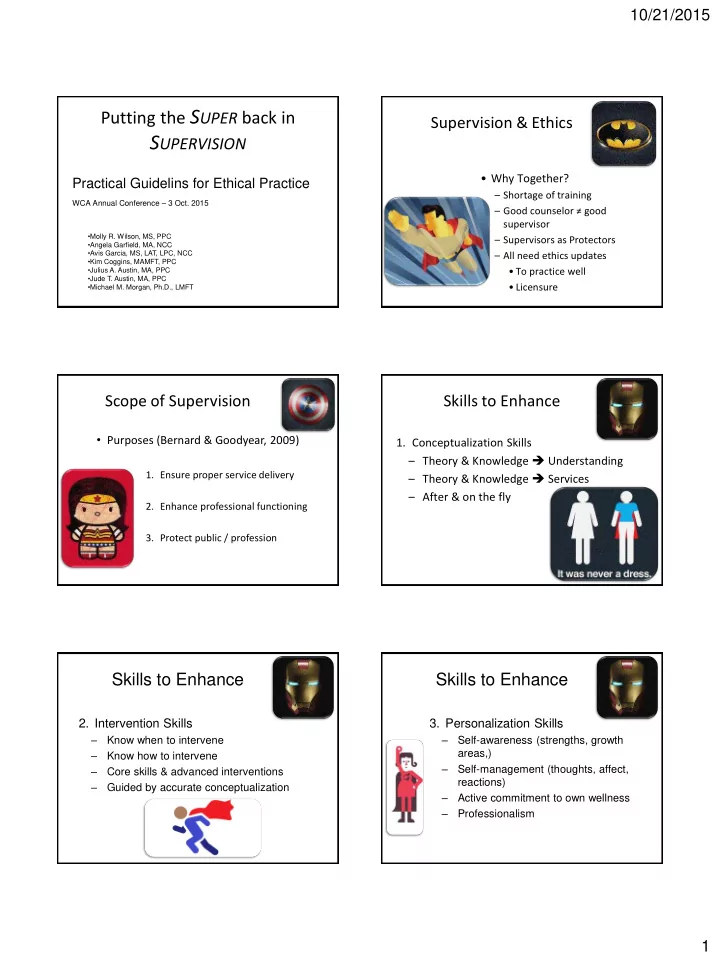

10/21/2015 Putting the S UPER back in Supervision & Ethics S UPERVISION • Why Together? Practical Guidelins for Ethical Practice – Shortage of training WCA Annual Conference – 3 Oct. 2015 – Good counselor ≠ good supervisor • Molly R. Wilson, MS, PPC – Supervisors as Protectors • Angela Garfield, MA, NCC • Avis Garcia, MS, LAT, LPC, NCC – All need ethics updates • Kim Coggins, MAMFT, PPC • Julius A. Austin, MA, PPC • To practice well • Jude T. Austin, MA, PPC • Licensure • Michael M. Morgan, Ph.D., LMFT Scope of Supervision Skills to Enhance • Purposes (Bernard & Goodyear, 2009) 1. Conceptualization Skills – Theory & Knowledge Understanding 1. Ensure proper service delivery – Theory & Knowledge Services – After & on the fly 2. Enhance professional functioning 3. Protect public / profession Skills to Enhance Skills to Enhance 2. Intervention Skills 3. Personalization Skills – – Know when to intervene Self-awareness (strengths, growth areas,) – Know how to intervene – Self-management (thoughts, affect, – Core skills & advanced interventions reactions) – Guided by accurate conceptualization – Active commitment to own wellness – Professionalism 1
10/21/2015 Things to Remember Ethics Reminders What is it? Supervision will be influenced by: – The philosophy of right and wrong conduct • Initial disclosure and contract Types: • Supervisor legal liability – Principle Ethics: Use of principles to evaluate • Bi-directional parallel process situations – “Is this behavior ethical?” • Supervisor self-stuff (awareness, – Virtue Ethics: Character traits to which a management, wellness) counselor aspires – “Am I doing what’s best for my client.” Guiding Principles Decision Model Steps to employ in decision making • Autonomy 1. Define the problem • Nonmaleficence 2. Consult professional codes • Beneficence 3. Further explore dimensions • Justice 4. Generate options, consequences • Fidelity 5. Implement and Review • Veracity Throughout process, consult with others 2014 Code Update 2014 Code Update Core Professional Values Clarified Technology (whole new section) • Don’t friend clients (or check out online) 1. Enhancing development across lifespan • Separate personal / professional online 2. Honoring diversity and dignity of all presence • 3. Promoting social justice Distance counseling (consent, procedures, confidentiality, limits, 4. Safeguarding the therapeutic relationship misunderstandings, crisis plans, jurisdiction) 5. Practicing competently and ethically 2
10/21/2015 2014 Code Update 2014 Code Update Refusing Services Client Confidentiality • • Can’t refuse services / refer solely based on a Obligation begins when a potential client values conflict seeks services. • Counselors seek training with values struggle Others – Ward vs. Wilbanks – See JCD, April 2014 • Terminally ill & end-of-life decisions – can’t – Keeton vs. Anderson-Wiley value refer (check state law) • No confirmation of life-threatening illness when others at risk (check state law) Ethics in Supervision Reflective Practice • Client Welfare Know your unconscious contribution to the session • Autonomic and emotional reactions based on • Gatekeeping patterns, experiences, culture, values, etc. – Supervisor competence - training • Goal: reflect on action then reflect in action • Cultivate in self and supervision • Supervisory relationship – Time, intentionality, respect & safety – Dual relationships – Informed consent & Confidentiality Wellness Supervision Models • Critical to avoid Counseling Kryptonite Provide some guidance on Wha t and How • – Burnout, compassion fatigue, unethical Developmental – Variation in confidence, self-awareness, practice, poor health, etc. . . need for support, direction – Requires counselor / supervisor commitment – Personal, yet attends to physical, emotional, • Three Dimensional Model intellectual, relational, & spiritual dimensions 1. Relationship (collaborative – directive) – Address in first session, self-appraisal, 2. Focus (narrow – broad) personal plans, regular review & support 3. Emphasis (clinical – professional) 3
10/21/2015 Supervision Roles Supervisor Roles Clinical Content dimensions create four roles: Teacher Coach 1. Coach: specific clinical work Emphasis 2. Teacher: broad clinical knowledge 3. Mentor: specific professional behavior Mentor Administrator 4. Administrator: broad professional standards Professional Narrow Wide Specificity 4
Recommend
More recommend